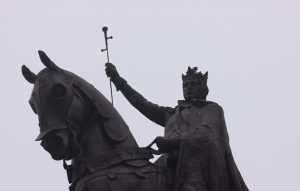
August 25 is the feast of Saint Louis, King of France, a model of Catholic statesmen, who participated in two crusades.
Dom Prosper Guéranger (1805-1875), the famous Abbot of Solesmes, makes some excellent commentaries about Saint Louis. From the pen of this great Catholic writer, one of the most important churchmen of his time, we see a series of considerations entirely in line with a counter-revolutionary viewpoint.
To begin his commentary, Dom Guéranger poses a complex problem. A saint must be humble. How can a king, who is at the top of the political and social hierarchy be humble? Is there not a contradiction between the two positions? Shouldn’t a humble person in authority look like a Marxist Cuban president? How do you reconcile the two conditions of being holy and humble? Dom Guéranger says:
The humility of holy kings is not forgetfulness of the great office they fulfill in God’s name. Their abnegation could not consist in giving up rights which are also duties, any more than charity could cast out justice, or the love of peace could oppose the virtue of the warrior.
As you see, Dom Guéranger is fighting against the sentimental idea of a holy king. This notion holds that humility would make a king unworthy of his office. A “humble” king would have to exercise mercy to the point that it would prevent him from administering justice. He would have to be such a peaceful man that he would be incapable of waging war. Dom Guéranger says that a holy king is the opposite. He practices humility but also displays grandeur. He practices charity but does so with much justice. On the other hand, he has a love of peace but also possesses authentic warrior virtues. This is the opposite of the sentimental notion of a holy king.
Help Remove Jesus Toilet Lid on Amazon
He continues to explain what he means:
Saint Louis, without his army, felt himself superior as a Christian to the victorious infidels and treated him accordingly.
In other words, when he became a prisoner of the infidels after their victory over him in battle, he always dealt with them fully aware of his dignity as a baptized person.
Moreover the west discovered very early, and more and more as his sanctity increased with his years, that this king who spent his nights in prayer, and his days in serving the poor was not the man to yield to anyone the prerogatives of the crown.
Satanic Christ Porn-blasphemy at Walmart — Sign Petition
He was, therefore, a man who pitied the poor and knew how to pray, yet was also a combative man who defends his prerogatives.
“There is but one king of France,” said the judge of Vincennes, rescinding a sentence of Charles of Anjou [his brother]; and the barons of the castle of Bellême, and the English at Taillebourg, were already aware of it.
How energetic he was in defending his rights is clear from an episode for which he became famous. Frederick II, the evil and heretical emperor of the Holy Empire, threatened to crush the Church and looked for accomplices in France. Saint Louis answered him thus: “The kingdom of France is not so weak as to suffer itself to fall to be driven by your spurs.” His lofty answer was proper to a saint. This is interesting because we must always react against the tendency to consider saints, and piety in general, from an overly sentimental standpoint.
How Panera’s Socialist Bread Ruined Company
The preceding article is taken from an informal lecture Professor Plinio Corrêa de Oliveira gave on August 25, 1965. It has been translated and adapted for publication without his revision. –Ed.


